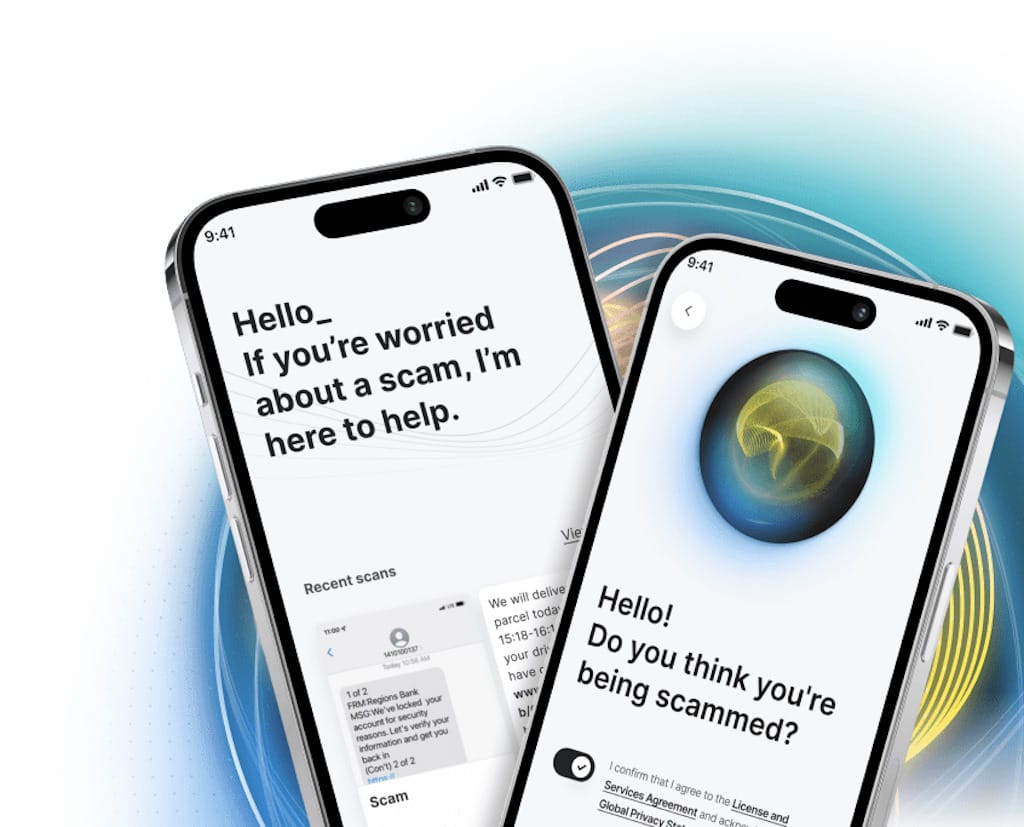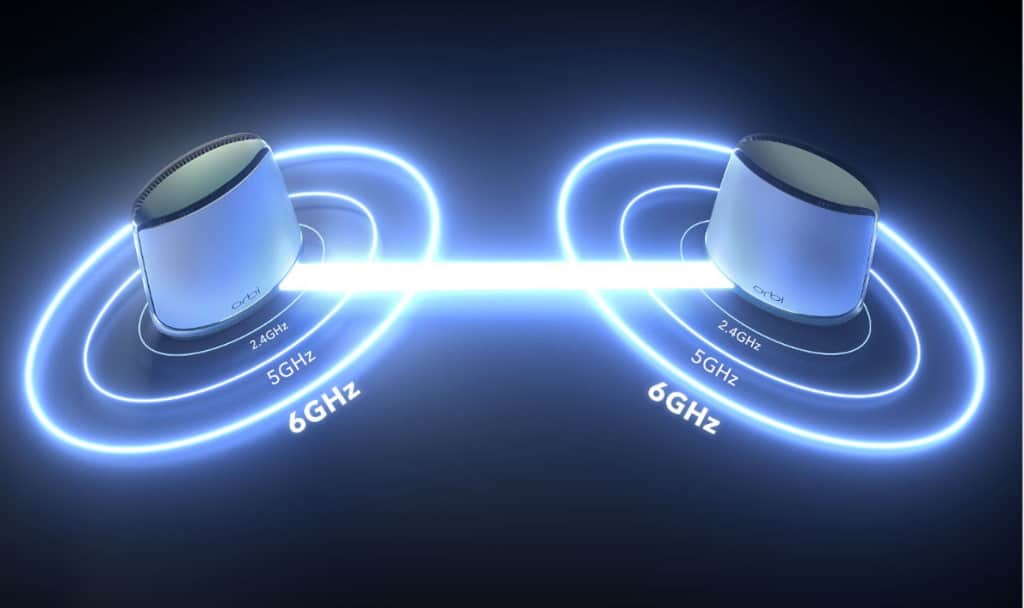GARY STEEL discovers what it’s like to experience a complete telecommunications blackout. He doesn’t want heads to roll. But would quite like an explanation.
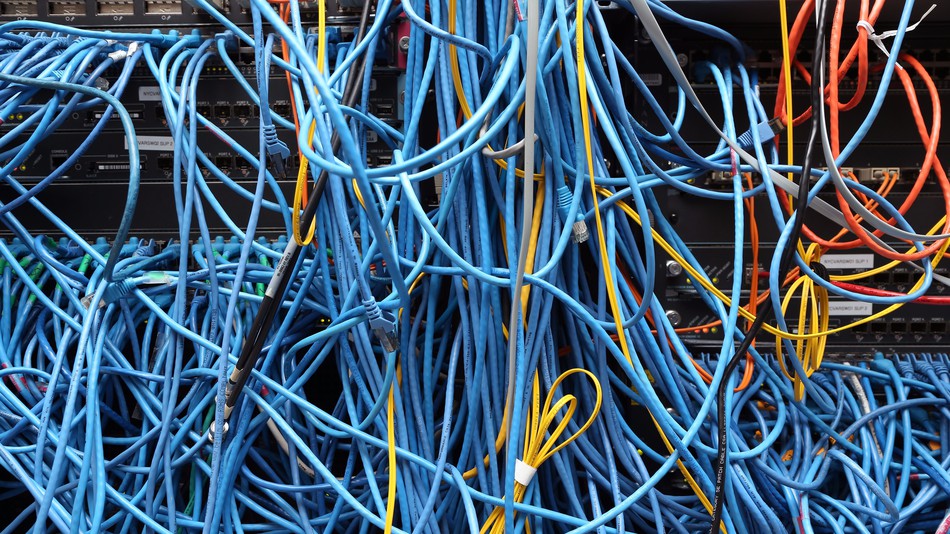
It was all just too good to be true. Last Wednesday, fibre came to my sleepy seaside community. It had been lying dormant underneath the nature strip for some months, just waiting for the Chorus crew to connect individual houses.
The installation went without a hitch. And I soon had a black cable snaking along the side of my deck and up through the wall of my first-story office to show for it; and on the other side of that wall, a non-descript white box just a little smaller than a modem pulsing its agreeable green light.
“I nearly let out a few Pentecostal “hallelujahs” in all the excitement”
The plan was to ring my service provider the next morning to organise the final part of the fibre dance, and sign up to a deal that would bring blazing fast internet to my village. As a signed-up, placard-carrying atheist I’m not usually tempted to give praise on high, but for a change my heart was brimming with optimism and I nearly let out a few Pentecostal “hallelujahs” in all the excitement.
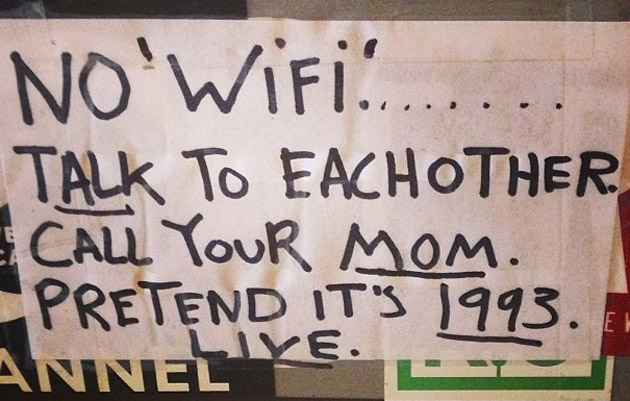 The next morning I fired up the usually fairly spritely VDSL-plus, only to find that nothing worked. I couldn’t even Google to find out why my internet wasn’t working. Not to worry, I figured. In outages, Spark always comes through with a generous temporary cellphone package so that I can use my iPhone’s internet capabilities on my computer.
The next morning I fired up the usually fairly spritely VDSL-plus, only to find that nothing worked. I couldn’t even Google to find out why my internet wasn’t working. Not to worry, I figured. In outages, Spark always comes through with a generous temporary cellphone package so that I can use my iPhone’s internet capabilities on my computer.
But my cellphone greeted me with the two worst words in the English language: ‘No Service’.
“There was no way to contact anyone to find out anything, so I jumped in the car”
What’s a poor boy to do?
We’re digital denizens with no clunky, old-fashioned landline. When we moved here three years ago I gave all that up, opting for an all-you-can-eat “naked” broadband package and a decent cellphone package instead.
It’s served us well. And the fairly frequent, fairly brief outages have been manageable. But NO SERVICE?!? There was no way to contact anyone to find out anything, so I jumped in the car and scouted around looking for the Chorus guys who were still installing fibre in the area.
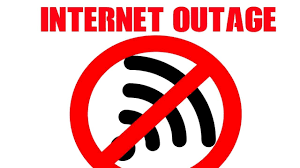 I found one of the two men who connected our fibre waist deep in a hole in the nature strip outside the local camping ground. I resisted the temptation to kick him in the face for killing my telecommunications, and was rewarded with the information that they had nothing to do with the outage.
I found one of the two men who connected our fibre waist deep in a hole in the nature strip outside the local camping ground. I resisted the temptation to kick him in the face for killing my telecommunications, and was rewarded with the information that they had nothing to do with the outage.
He explained that water pipes were being installed beside the road, about 10kms towards Dargaville, our closest service town. And they’d inadvertently cut through the cables. The chap waved his cellphone around and said, as if in shock: “Even I can’t use my phone!” Fancy that, a Chorus installer whose own cellphone bears the very same two evil words as mine: ‘No Service’!
“I resisted the temptation to kick him in the face for killing my telecommunications”
By this point, my enthusiasm for giving praise to the non-existent deity had vanished, along with the hallelujahs.
The rest of the afternoon I spent in a kind of half state between panic, confusion and the kind of anger that turns up out of the blue when there’s no way of finding out WHAT THE FUCK’S GOING ON.
Panic, because I was on a work deadline. And couldn’t even contact my publisher to explain my tardiness and confusion, because these black-out conditions were so new to me that they had my head spinning with “what the heck to do about it all”, and anger… well, for obvious reasons.
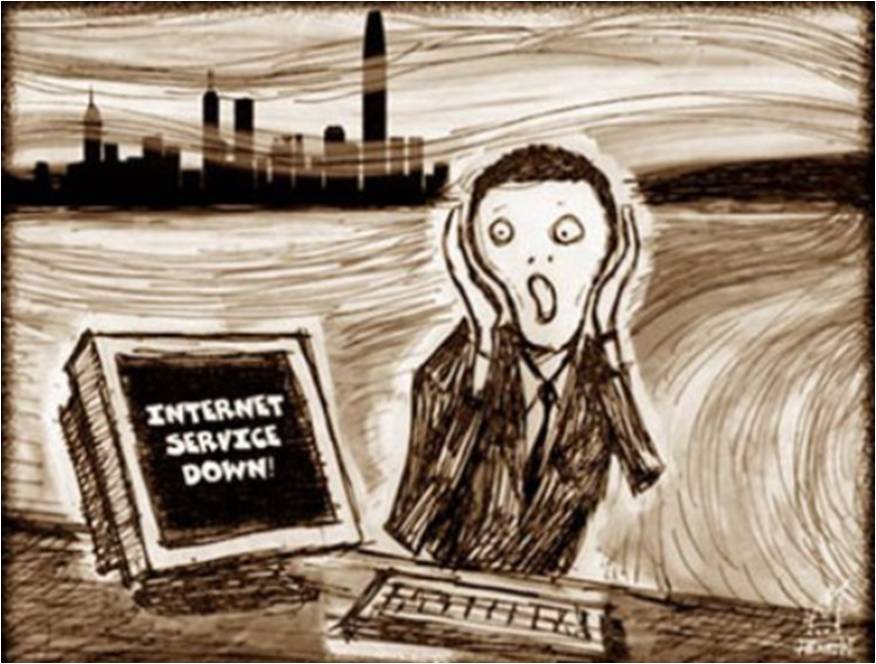 After dinner I found a brief window before my Daddy duties kicked in. I drove the 10kms into town, where I spoke to one of Spark’s wonderful call help people. She did her best from her battery-cage somewhere in India, but unsurprisingly, she was geographically challenged about New Zealand, and could only provide me with the barest details: “There’s been an outage in your area, internet and cellphones are not working, you’d better turn your phone off and check to see if it’s working in the morning.”
After dinner I found a brief window before my Daddy duties kicked in. I drove the 10kms into town, where I spoke to one of Spark’s wonderful call help people. She did her best from her battery-cage somewhere in India, but unsurprisingly, she was geographically challenged about New Zealand, and could only provide me with the barest details: “There’s been an outage in your area, internet and cellphones are not working, you’d better turn your phone off and check to see if it’s working in the morning.”
“She did her best from her battery-cage somewhere in India, but was geographically challenged about New Zealand”
I went home with my tail between my legs and – I have to admit – enjoyed the simplicity of not irradiating my face with the computer screen’s blue light and reading a book instead, and cranking up the dusty old Blu-ray player for the child.
But underneath the enforced trip back to the future’s past, I felt increasingly upset at the communications blackout. We’re a family with two young kids. There are many others in the neighbourhood, and a number of elderly and vulnerable.
Vulnerability: that’s the thing. With no way to contact anyone, you realise just how completely we’ve been conned into believing that technology will see us right.
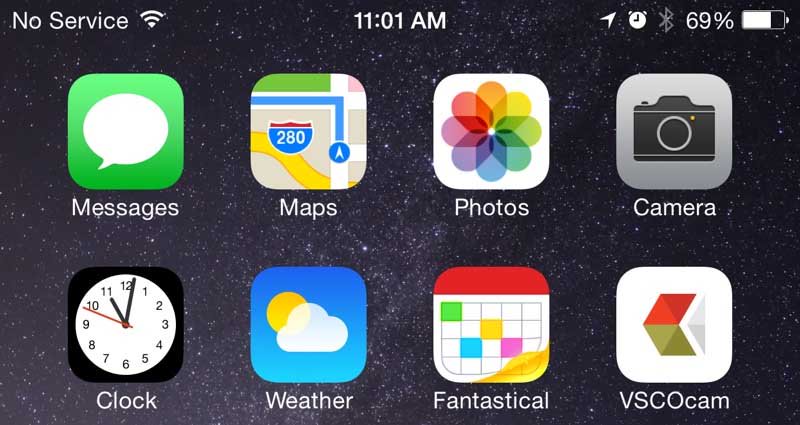 The next morning I cranked up the phone as the nice outsourced Spark lady suggested, but was greeted with the same, unsmiling ‘No Service’. I cranked up the laptop and nothing was going to happen anytime soon.
The next morning I cranked up the phone as the nice outsourced Spark lady suggested, but was greeted with the same, unsmiling ‘No Service’. I cranked up the laptop and nothing was going to happen anytime soon.
So I jumped in the car and headed to town. Ironically, I had to go past the people who had cut through the cables, and as they’d reduced the road to one lane and I was ordered to stop and form an orderly queue, I took the opportunity to ask the usher what the heck was going on.
He said that someone cut through the cable, and that Chorus was working on it now, but couldn’t say when it would be fixed. As he put up the green ‘Go’ sign, I heard him exclaim in his communications device: “ANOTHER one just asked me about the outage.”
“Someone had cut through the cable and Chorus was working on it now”
Parked in town, I set to trying to find a definitive answer to what was going on and when we might expect it to be fixed. Neither national news organisations or the local paper had anything about the issue, so I headed to local community Facebook pages. Where (eventually) I found a post about the issue and someone who had spoken to their service provider and been assured that Chorus was on track to fixing the cut cables by mid-afternoon. (Never mind that few people could read it, because they needed the internet to do so.)
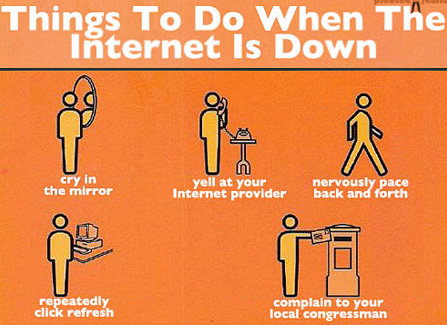 While that was good news, I wanted to know more. I wanted to know who cut the cables and why it happened. I wanted to know why the company responsible hadn’t come out to my small community of around 200 people, knocked on doors and explained the outage and given their apologies.
While that was good news, I wanted to know more. I wanted to know who cut the cables and why it happened. I wanted to know why the company responsible hadn’t come out to my small community of around 200 people, knocked on doors and explained the outage and given their apologies.
Something that with a couple of people on the ground could have been done in a couple of hours. I wanted to know why the outage didn’t seem to be there for the finding on any websites. I wanted to know the name of the company responsible for laying the water pipes, because there was no signage and there were no contact details at the site of the road works, and that’s something I think should be obligatory in 2019.
“I wanted to know why the company responsible hadn’t come out to my small community”
After searching fruitlessly for some time I headed over to the Kaipara District Council (KDC) where I bugged the receptionist for information. They had nothing to do with the laying of the blue water pipes, but suggested a few possibilities, including the NZ Transport Agency and various subcontractors.
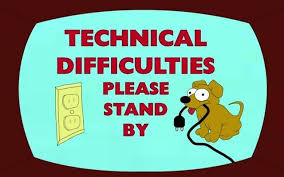 Having wasted precious time on this puzzle, and getting little closer to the truth, I headed home to the blackout zone, where, mid-afternoon, both the internet and phone came back to life and everyone breathed a great sigh of relief.
Having wasted precious time on this puzzle, and getting little closer to the truth, I headed home to the blackout zone, where, mid-afternoon, both the internet and phone came back to life and everyone breathed a great sigh of relief.
It had been more than 24 hours and none of my Facebook so-called ‘friends’ had noticed my absence, but I’d gotten far enough behind in my work that it would take a concerted, weekend-long effort to dig myself out of this metaphorical hole.
“I’m not stuck in a refugee camp with no electricity or bog and the ever-present threat of violence and disease”
And yeah, I can already hear a chorus (ha!) of John Key fans going, “Harden up, you sissy!” After all, it’s not like a 24-hour telecommunications breakdown is the end of the world, and I’m not stuck in a refugee camp with no electricity or bog and the ever-present threat of violence and disease. In the scheme of things, my blackout is infinitesimally small.
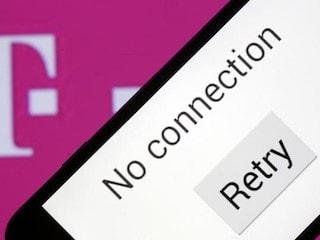 None of which changes the fact that someone is at fault for what happened, and failed to do anything to provide information to the people affected by it, which is a dereliction of what should be a basic duty.
None of which changes the fact that someone is at fault for what happened, and failed to do anything to provide information to the people affected by it, which is a dereliction of what should be a basic duty.
Three days on, and there still hasn’t been an official explanation of what happened and why or any kind of apology or (God forbid!) offer of compensation.
I don’t blame my service provider. I blame whoever is responsible for bringing down both internet and cellphone services simultaneously, and then utterly failing in their duty to let the community know what was going on. I’m still waiting for that explanation. And they’re more than welcome to pay me for a day’s work lost.
“I blame whoever is responsible, who then utterly failed in their duty to let the community know what was going on”
That would be a miracle worthy of a genuine hallelujah, however, going on New Zealand’s lamentable response to outages. I live in a tiny community, so I’m not surprised at the appalling lack of care, but the same kind of shit goes on in major cosmopolitan areas like Auckland with few, if any, consequences.
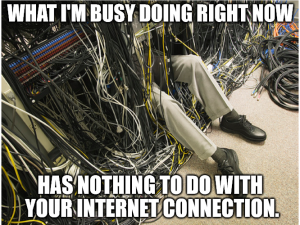 When I lived in Auckland, I remember getting blasted by social media dwellers that didn’t take kindly to my comments when a small storm and a few trees downed took out power to most of the city… again.
When I lived in Auckland, I remember getting blasted by social media dwellers that didn’t take kindly to my comments when a small storm and a few trees downed took out power to most of the city… again.
They interpreted my enmity as being directed at the brave folks who get up and fix power during a storm in the middle of the night – all these fantastic volunteers who take the place of solid infrastructure.
It’s this lack of maintenance and proper infrastructure over many years that’s the Auckland power problem, with most of the cash going to shareholders. When then-Prime Minister John Key was asked about it years ago he said we shouldn’t expect ‘gold standard’ service, as if we were doomed to live a Third World type of existence while he parties in his holiday hideaways.
“In Japan, if a suburb or a street gets a power or telecommunications outage, compensation or reduced rates are guaranteed”
In Japan, if a suburb or a street gets a power or telecommunications outage, compensation or reduced rates are guaranteed. In New Zealand, the idea of this is greeted with a suspicion that maybe I’m not a real Kiwi, because people like us don’t ask for compensation, or kick up a fuss.
We’re good blokes and blokesses who continue to ‘do the right thing’ and help out where needed and give money to all those causes (like St John’s Ambulance or the Cancer Society) that should be fully funded by the government through our taxes.”“
 There’s a lot to like about that old-fashioned, stalwart Kiwi archetype and it’s still going strong in some areas. But really, just like sexism in the workplace and bullying at school, it’s had its time.
There’s a lot to like about that old-fashioned, stalwart Kiwi archetype and it’s still going strong in some areas. But really, just like sexism in the workplace and bullying at school, it’s had its time.
And hey, whoever caused the outage: I’m still waiting for the apology.
POSTSCRIPT: In the weeks that followed this story I kept on asking questions, and receiving very little in the way of clarification, until NZTA replied to my query with the revelation that the contracting work that caused the outage had, in fact, taken place under the auspices of the KDC (Kaipara District Council) by a firm called Broad Spectrum. NZTA gave me a name and an email address at KDC, so I sent my concerns through to them. Their website said to expect replies within five days, so after nearly two weeks I sent through a reminder. I promptly got a phone call from someone who said they hadn’t received my email, so I gave her the ‘case number’ to prove that I had, in fact, sent the email, and explained the whole situation on the phone. A few days later I got a short, cursory email from the administration manager at the KDC: “Thank you for your email which has been passed onto me today to respond. I’m sorry you have been given the runaround during your dealings with council. I have been told it was one of our contractors who cut the telecommunications cable and it is unfortunate there was no-one on site that could have explained the situation better and avoided the confusion you suffered. On behalf of our contractors I apologise for the inconvenience caused by having no telecommunications.”
Finding this unsatisfactory, I sent her the following email:
“Thanks for your reply, Linda, but it doesn’t in any way answer my questions, or resolve the issues around this.
The big question is this: Should the same thing happen again (that is, if Broad Spectrum cut through the wires again and there was another big telecommunications blackout at Baylys Beach) WOULD THINGS PLAY OUT ANY DIFFERENTLY?
I’d like to know that the person at the KDC who denied that it was anything to do with the council had actually been spoken to and put right for the future.
I’d like to know that the KDC had discussed the issue with Broad Spectrum and that they had acknowledged that they handled the problem poorly, and put into place a better response to those impacted by the blackout.
I’d like to know what steps had been put into place to quickly inform those impacted by such an event. [As I said in my original piece, had someone taken responsibility on the day, someone could have visited every occupied home at Baylys Beach on foot within about an hour to inform them of what was going on. Instead, nothing.]
I’d like to know what the KDC are going to do so that in the future, events like this are publically notified – either in the Lifestyler or on your website or both – because it was hellishly hard just to find out the basic information.”
Happily, a week later I received a much better response from the KDC:
“Three of our staff have had several discussions about what went wrong during the telecommunications outage. As a result we have added some additional measures which should help with future communications when situations like this occur.
- All council outages will be placed on Facebook.
- Improved communication lines and awareness are being developed with our customer services center and contractors.
- We have recently introduced a new app called Antenno. This can be downloaded through your normal app store. Once addresses of note are entered notifications of any outages will be sent via text message to your mobile. We think this is a great new service which will improve the communication of outages, both with council services and affiliated services.”
This is a really great response, but do you see the potential problem with the solution?
Yep, if there’s a telecommunications blackout (that is, both internet and mobile phone services go down) no one will be able to access either the KDC’s Facebook page or this marvellous new app!
What it does mean, however, is that if only Baylys Beach residents are impacted by a blackout, someone can jump in their car and head into Dargaville to access Facebook or the app, and then report back to the community.
While I still think that Broad Spectrum should have come up with an instant solution – like getting off their asses and coming out and knocking on doors – at least this goes some way to providing the information that was sorely lacking during and after this outage.
And what I’d suggest for Baylys Beach residents is that they appoint someone, or perhaps a small team, in the community to act as liaison in such a blackout to inform the more vulnerable people in the community about what’s going on.





